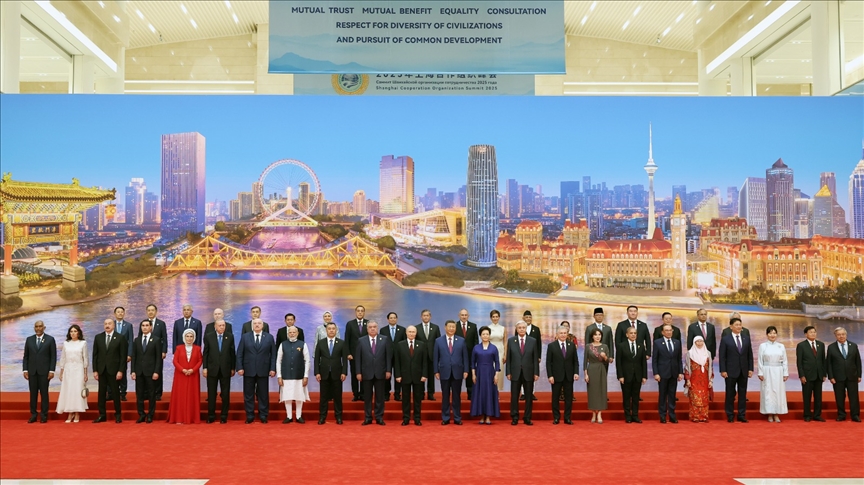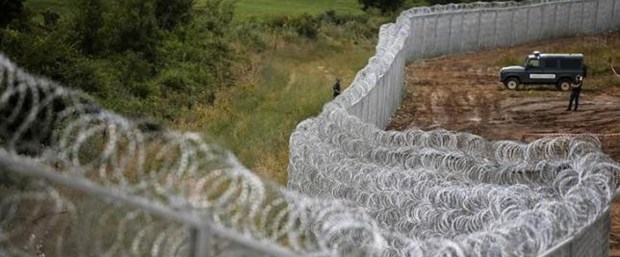
This is the English translation of a Turkish language article that was originally published by AVİM on 13 November 2024.
The civil war in Syria has shaped much of regional and global dynamics. While Russia and Iran were the biggest supporters of the Assad regime, another important actor supporting the Assad regime was the China. China has voted in favor of the Assad regime ten times in the United Nations Security Council. In earlier periods, the Beijing administration preferred to remain abstaining, but it has used its veto power regarding the Assad regime. This has been interpreted as a sign of a more proactive foreign policy. With the end of the 61-year Ba’ath regime in Syria on December 8, 2024, it has been a matter of debate whether China, one of the supporters of the Assad regime, needs a new approach to Syria or is a losing side of the Syrian war. In order to answer these questions, it is necessary to briefly examine China's recent policies towards Syria and the Middle East.
The Beijing administration, which already has good relations with Russia and Iran, has developed new foreign policy approaches in the Middle East in line with the proactive foreign policy approach developed under President Xi Jinping. In this context, China has been involved in various political, diplomatic and economic initiatives. Firstly, China and Iran signed a “Long-Term Cooperation Road Map”, which is known as the “Iran-China 25-Year Comprehensive Cooperation Agreement", in March 2021. Although the details of the agreement have not been disclosed, the aim is to develop commercial and economic relations. In 2023, China initiated an attempt at mediation has been initiated between Saudi Arabia and Iran , two significant regional powers of the Middle East, who have severed their diplomatic relations and have many political and regilious disputes. Although the stated mediation was interrupted by the impact of the Gaza War, it has been stated recently that the negotiations between Iran and Saudi Arabia will continue. Another crucial mediation attempt of the Beijing administration in the Middle East is aimed at the Palestine issue, which is the most important issues of the region. A few months before the Gaza War, 14 different groups in Palestine, including Hamas, came together under the leadership of China and then the Beijing Declaration, which is a compromise document was signed.[1] Additionally, the Beijing administration expressed that China could play a role between Israel and Palestine. However soon after, the Gaza War broke out. Moreover China, conducted summit diplomacy with the Gulf Cooperation Council and the Arab League. The initiatives expressed are a reflection of China's efforts to become an “internationally responsible actor” in its Middle East policy. Despite the decision to reduce the US presence in the Middle East, it is seen that China wants to increase its influence in the Middle East through economic, political and diplomatic methods.
China has taken some steps to increase its support fort he Assad regime since 2022. Firstly, Syria joined the “Belt and Road Initiative” (BRI) in 2022.[2] In 2023, Bashar al-Assad was invited to the 19th Asian Games in Beijing. During President Xi’s meeting with Assad, issues such as trade and the reconstruction of Syria were discussed.[3] After the meeting, a joint statement on the establishment of a “strategic partnership” between the two countries was issued.[4] Thus, relations have been taken to the next level. However, despite the two important developments stated, when China's investments in Syria are examined, it is seen that there is no significant increase in economic investments and bilateral trade.[5] This situation shows that Syria is not considered suitable for investments by Beijing. Therefore, this situation is another indicator that the Middle Corridor offers a safer route than the South Corridor.
In December 8, 2024, as a result of the advance of the Syrian opposition group led by the Hay’at Tahrir al-Sham (HTS), the Assad regime was overthrown in a short period of time. Russia and Iran have not prevented this transformation in Syria. China on the other hand, followed a wait-and-see policy, first making a statement on the security of Chinese citizens. China was too late to react. Some experts interpret this situation as China's lack of intelligence information, its failure to adapt to changing conditions, and limitations in its Middle East policy.[6] Additionally, it has been claimed that the knowledge of the region is also lacking.[7] China adopted a similar attitude and followed a wait-and-see policy when the Hamas attacks started. China has only called on the parties to show restraint. Also shortly after the Beijing Declaration, the Gaza war began. These events damaged China’s prestige. On the other hand, the overthrow of the Assad regime has raised a different security threat for China. It is claimed that there are Uighur separatists among the Syrian opposition group.[8] There have been allegations that members of the Turkistan Islamic Party are fighting in Syria with members of the HTS.[9] In 2017, the Syrian ambassador to China claimed that there are 5,000 ethnic Uighurs in Syria.[10] However, there are also different views arguing that China is not a loser in Syria due to its economic presence rather than its military presence but rather it has the potential to gain by contributing to the reconstruction of the country.[11] If the Beijing administration aims to overcome the loss of prestige that it experienced, deal with the perceived security threat and achieve economic and political gain, it should try to establish relations with the new administration to be formed in Syria. Considering the dialogue it has established with Taliban administration in Afghanistan, despite Afghanistan’s political turmoil, China has the possibility of establishing relations with the new administration through various political and economic compromises. On the other hand, if China is unable to establish relations with the new administration of Syria, which is included in the BRI, it will would be a development that could undermine the coherence and continuity of the BRI.
Some analysts argue that the policy tools developed by China for the Middle East region are essentially based on Iran’s power in the region and its close ties with Iran. Therefore, it is suggested that instead of maintaining close ties with weakening Iran in Syria, in the post-Assad era, China will choose to establish close relations with Türkiye, an actor that can exert influence in Syria due to its support for the Syrian opposition group since the beginning of the Syrian civil war.[12] However, the Iranian Foreign Minister met with the Chinese Foreign Minister in Beijing on December 28.[13] This visit was important in terms of it being the first official visit of the new government in Iran to Beijing. During the meeting, it was stated that “respect to territorial integrity” and “facilitating the humanitarian process” should be provided emphasized regarding the Syrian issue.[14] On December 29, an article by Iranian Foreign Minister Araghchi was published in China Daily which mentioned the close ties between China and Iran.[15] After the visit, the Chinese Foreign Ministry spokesperson stated that China will continue to play a constructive role in the Middle East.[16] It is possible to interpret these developments as indicators of the desire to maintain close relations between Tehran and Beijing. However, it is argued that a way for China to exert influence in Syria depends on reaching a consensus with Turkiye.[17] On the other hand, China did not participate in the International Meeting on the future of Syria held in Jordan in December 14. For China, the main method to develop relations with the new government to be established in Syria is to create commercial and economic cooperation for the reconstruction of Syria and contribute to the humanitarian processs. Considering that Türkiye is expected to play the main role to reconstruction in the Syria, there is a risk that Türkiye and China will be at odds over the reconstruction of Syria. However, this risk can be overcome with coordination. Thus, a new area of cooperation may occur between Türkiye and China. In conclusion, in order to achieve the goal of increasing its international status and prestige as a responsible actor, China is likely to react early to regional and global problems and develop policies that adapt to the transformations.
[1] "Pekin Deklarasyonu’na Dair Tüm Bilinenler". July 23, 2024, Independent Türkçe. Accessed https://www.indyturk.com/node/739666/d%C3%BCnya/pekin-deklarasyonuna-dair-t%C3%BCm-bilinenler .
[2] "Syria Joined China’s Belt and Road Initiative". January 30, 2022, Food Export Trade News. Accessed https://foodexporttrade.com/news/syria-joined-china-s-belt-d-road-initiative/
[3] "Xi ve Esad, Çin-Suriye Stratejik Ortaklık İlişkilerinin Kurulduğunu Duyurdu". September 22, 2023, CGTN Türk. Accessed https://turkish.cri.cn/2023/09/22/ARTI4madkXOJomrXewLxbuE0230922.shtml
[4] Gezer, G. "Suriye-Çin Stratejik Ortaklığı". September 25, 2023, Independent Türkçe. Accessed https://www.indyturk.com/node/663086/t%C3%BCrki%CC%87yeden-sesler/suriye-%C3%A7in-stratejik-ortakl%C4%B1%C4%9F%C4%B1
[5] Palmer, J. "China Needs a New Approach in Syria". December 10, 2024, Foreign Policy. Accessed https://foreignpolicy.com/2024/12/10/china-syria-assad-fall-rebel-offensive/
[6] Chen, L., Pomfret, J. ve Slodkowski, A. "Assad’s Fall Shows Limits of China’s Middle East Policy". December 15, 2024, Taipei Times. https://www.taipeitimes.com/News/editorials/archives/2024/12/15/2003828514
[7] Koyuncu, M. C. (2024, 14 Aralık). "China’s Stance on Syria’s Turmoil: New Chapter in Geopolitical Strategy". January 2, 2025, Türkiye Today. Accessed https://www.turkiyetoday.com/region/chinas-stance-on-syrias-turmoil-new-chapter-in-geopolitical-strategy-93021/
[8] Blanchard, B. "Syria Says up to 5,000 Chinese Uighurs Fighting in Militant Groups". May 11, 2027, Reuters. Accessed https://www.reuters.com/article/world/syria-says-up-to-5000-chinese-uighurs-fighting-in-militant-groups-idUSKBN1840UM/ ; Korybko, A. "Uyghur Separatist Threat Could Reach Beyond China’s Xinjiang". December 17, 2024, Asia Times. Accessed https://asiatimes.com/2024/12/uyghur-separatist-threat-could-reach-beyond-chinas-xinjiang/; Palmer, J. "China Needs a New Approach in Syria". December 10, 2024, Foreign Policy. Accessed https://foreignpolicy.com/2024/12/10/china-syria-assad-fall-rebel-offensive/
[9] Korybko, A. "Uyghur Separatist Threat Could Reach Beyond China’s Xinjiang". December 17, 2024, Asia Times. Accessed https://asiatimes.com/2024/12/uyghur-separatist-threat-could-reach-beyond-chinas-xinjiang/
[10] Blanchard, B. "Syria Says up to 5,000 Chinese Uighurs Fighting in Militant Groups". 11 May 11, 2017, Reuters. Accessed https://www.reuters.com/article/world/syria-says-up-to-5000-chinese-uighurs-fighting-in-militant-groups-idUSKBN1840UM/
[11] Yong, J. "China’s New Silk Road Might Go Through Syria, Skipping Russia". December 14, 2024, Asia Times. Accessed https://asiatimes.com/2024/12/chinas-new-silk-road-might-go-through-syria-skipping-russia/
[12] Palmer, J. "China Needs a New Approach in Syria". December 10, 2024, Foreign Policy. Accessed https://foreignpolicy.com/2024/12/10/china-syria-assad-fall-rebel-offensive/
[13] "Top Chinese Diplomat Meets Visiting Iranian FM in Beijing, Emphasizes Enhanced Coordination and Cooperation". December 28, 2024, Global Times. Accessed https://www.globaltimes.cn/page/202412/1325923.shtml
[14] Zhao, J. "China, Iran Reaffirm Commitment to Peace". December 29, 2024, China Daily. Accessed https://www.chinadaily.com.cn/a/202412/29/WS67714e91a310f1265a1d57da.html
[15] Araghchi, S. A. (2024, 29 Aralık). "Joint Actions Define Strategic Depth of Beijing-Teheran Ties". China Daily. Accessed https://www.chinadaily.com.cn/a/202412/29/WS677156f7a310f1265a1d57e9.html
[16] "Çin: Ortadoğu’daki Yapıcı Rolümüzü Sürdüreceğiz". December 30, 2024, CGTN Türk. Accessed https://turkish.cri.cn/2024/12/30/ARTI1735551159118700
[17] Palmer, J. "China Needs a New Approach in Syria". December 10, 2024, Foreign Policy. Accessed https://foreignpolicy.com/2024/12/10/china-syria-assad-fall-rebel-offensive/
© 2009-2025 Center for Eurasian Studies (AVİM) All Rights Reserved
No comments yet.
-
 APEC LIMA SUMMIT
APEC LIMA SUMMIT
Seyda Nur OSMANLI 28.01.2025 -
 SYRIA AND CHINA AFTER THE ASSAD REGIME
SYRIA AND CHINA AFTER THE ASSAD REGIME
Seyda Nur OSMANLI 18.02.2025 -
 THE D-8 CAIRO SUMMIT
THE D-8 CAIRO SUMMIT
Seyda Nur OSMANLI 06.02.2025 -
 TIANJIN SUMMIT OF THE SHANGHAI COOPERATION ORGANISATION
TIANJIN SUMMIT OF THE SHANGHAI COOPERATION ORGANISATION
Seyda Nur OSMANLI 04.11.2025
-
 THE FORCED EXILES OF THE CRIMEAN TATARS AND THE CIRCASSIANS
THE FORCED EXILES OF THE CRIMEAN TATARS AND THE CIRCASSIANS
Turgut Kerem TUNCEL 24.05.2017 -
 ARMENIAN COOPERATION IN THE TSARDOM OF RUSSIA’S OCCUPATION OF EASTERN ANATOLIA DURING WORLD WAR I
ARMENIAN COOPERATION IN THE TSARDOM OF RUSSIA’S OCCUPATION OF EASTERN ANATOLIA DURING WORLD WAR I
Ahmet Can ÖKTEM 23.11.2020 -
 THE EU CONTRADICTS ITSELF BY CRITICISING TRUMP FOR BUILDING THE WALL ALONG THE US-MEXICO BORDER
THE EU CONTRADICTS ITSELF BY CRITICISING TRUMP FOR BUILDING THE WALL ALONG THE US-MEXICO BORDER
Hazel ÇAĞAN ELBİR 21.02.2017 -
SYMPOSIUM TITLED "PROSPECTS FOR TURKISH-ARMENIAN RELATIONS" AT ANKARA PALACE
AVİM 29.04.2015 -
 IRAN-CHINA DIPLOMATIC MEETING IN BEIJING
IRAN-CHINA DIPLOMATIC MEETING IN BEIJING
Farzana HEDAYAT - Fatema MIAKHEL 01.10.2015
-
25.01.2016
THE ARMENIAN QUESTION - BASIC KNOWLEDGE AND DOCUMENTATION -
12.06.2024
THE TRUTH WILL OUT -
27.03.2023
RADİKAL ERMENİ UNSURLARCA GERÇEKLEŞTİRİLEN MEZALİMLER VE VANDALİZM -
17.03.2023
PATRIOTISM PERVERTED -
23.02.2023
MEN ARE LIKE THAT -
03.02.2023
BAKÜ-TİFLİS-CEYHAN BORU HATTININ YAŞANAN TARİHİ -
16.12.2022
INTERNATIONAL SCHOLARS ON THE EVENTS OF 1915 -
07.12.2022
FAKE PHOTOS AND THE ARMENIAN PROPAGANDA -
07.12.2022
ERMENİ PROPAGANDASI VE SAHTE RESİMLER -
01.01.2022
A Letter From Japan - Strategically Mum: The Silence of the Armenians -
01.01.2022
Japonya'dan Bir Mektup - Stratejik Suskunluk: Ermenilerin Sessizliği -
03.06.2020
Anastas Mikoyan: Confessions of an Armenian Bolshevik -
08.04.2020
Sovyet Sonrası Ukrayna’da Devlet, Toplum ve Siyaset - Değişen Dinamikler, Dönüşen Kimlikler -
12.06.2018
Ermeni Sorunuyla İlgili İngiliz Belgeleri (1912-1923) - British Documents on Armenian Question (1912-1923) -
02.12.2016
Turkish-Russian Academics: A Historical Study on the Caucasus -
01.07.2016
Gürcistan'daki Müslüman Topluluklar: Azınlık Hakları, Kimlik, Siyaset -
10.03.2016
Armenian Diaspora: Diaspora, State and the Imagination of the Republic of Armenia -
24.01.2016
ERMENİ SORUNU - TEMEL BİLGİ VE BELGELER (2. BASKI)
-
AVİM Conference Hall 24.01.2023
CONFERENCE TITLED “HUNGARY’S PERSPECTIVES ON THE TURKIC WORLD"









